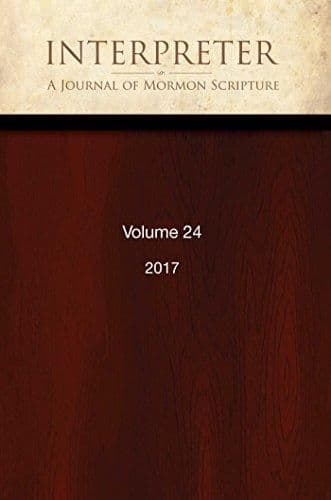Journal
“We Might Have Enjoyed Our Possessions and the Land of Our Inheritance”: Hebrew yrš and 1 Nephi 17:21

Title
“We Might Have Enjoyed Our Possessions and the Land of Our Inheritance”: Hebrew yrš and 1 Nephi 17:21
Publication Type
Journal Article
Year of Publication
2022
Authors
Bowen, Matthew L. (Primary)
Journal
Interpreter: A Journal of Latter-day Saint Faith and Scholarship
Pagination
123-144
Volume
50
Abstract
The verbal expression “we might have enjoyed,” as used in a complaint that Nephi attributes to his brothers, “we might have enjoyed our possessions and the land of our inheritance” (1 Nephi 17:21), reflects a use of the Hebrew verb yrš in its progressive aspect, “to enjoy possession of.” This meaning is evident in several passages in the Hebrew Bible, and perhaps most visibly in the KJV translation of Numbers 36:8 (“And every daughter, that possesseth [Hebrew yōrešet] an inheritance [naḥălâ] in any tribe of the children of Israel, shall be wife unto one of the family of the tribe of her father, that the children of Israel may enjoy [yı̂ršû] every man the inheritance [naḥălat] of his fathers”) and Joshua 1:15 (“then ye shall return unto the land of your possession [lĕʾereṣ yĕruššatkem or, unto the land of your inheritance], and enjoy it [wı̂rištem ʾôtāh].” Examining Laman and Lemuel’s complaint in a legal context helps us better appreciate “land[s] of … inheritance” as not just describing a family estate, but as also expressing a seminal Abrahamic Covenant concept in numerous Book of Mormon passages, including the covenant implications of the resettlement of the converted Lamanites and reconverted Zoramites as refugees in “the land of Jershon” (“place of inheritance”).
For a summary of this article, check out Interpreting Interpreter: https://interpreterfoundation.org/interpreting-interpreter-enjoying-inherited-possessions/
Subject Keywords
Bibliographic Citation
Terms of use
Items in the BMC Archive are made publicly available for non-commercial, private use. Inclusion within the BMC Archive does not imply endorsement. Items do not represent the official views of The Church of Jesus Christ of Latter-day Saints or of Book of Mormon Central.